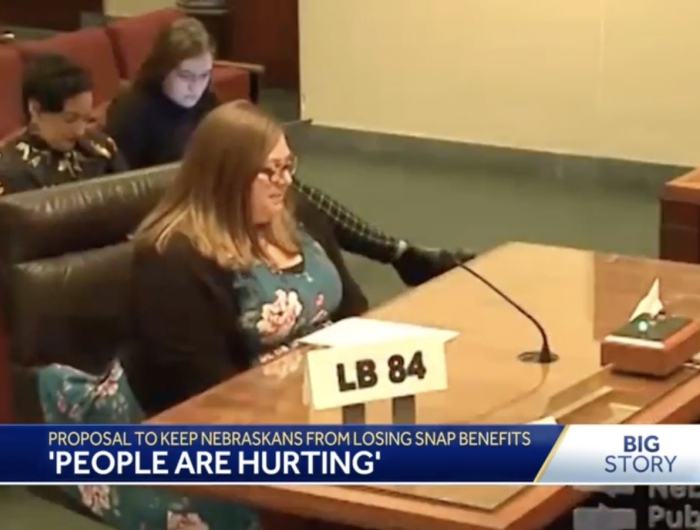A SNAP legislative win that maintains benefits for 10,000 Nebraskans

KETV ABC 7.
Our campaign to improve SNAP in Nebraska
Partnering with CSPI to fight hunger since 2021, Nebraska Appleseed successfully advocated for the passage of LB108, a bill that reduced the Supplemental Nutrition Assistance Program (SNAP) “cliff effect.” The bill increased Nebraska’s SNAP gross income limit from 130% of the Federal Poverty Level to 165%, allowing over 10,000 Nebraskans to access the program and helping families move ahead in their jobs while maintaining benefits.
Going into the 2023 legislative session was a pivotal moment to eliminate or extend the sunset provision, maintain the increased income limit, and ensure thousands of Nebraska households didn't lose access to the food assistance they need. Our team worked with key partners and impacted Nebraskans to introduce LB84, which would have removed the sunset provision altogether.
To set ourselves up for success, we convened a Nebraska SNAP Advocates Coalition made up of direct service and advocacy nonprofits, industry associations, and lobbyists; worked with a senator who agreed to champion the bill; and requested and received data about households impacted by the change from our Department of Health and Human Services and legislative fiscal office. We also prepared to navigate challenges stemming from an election year, including lots of institutional turnover at our state legislature, aggressive efforts to pass controversial new restrictions on gender-affirming care and reproductive health, and a new governor.
We also launched our inaugural client leadership model called the Food Access Community Advocates Cohort. Knowing we would be introducing legislation to eliminate the sunset, our food access community organizer sought impacted Nebraskans committed to building up skills, sharing their personal stories publicly, and participating intentionally in this nine-month leadership development and advocacy training program. We compensated cohort members for their time and expertise and ultimately had five individuals learning and advocating together. This cohort model allowed us to respond quickly to media requests and short notice for legislative actions, provide compelling personal stories of impact along with data, and start a statewide network of food advocates with the skills and drive to push for long-term systemic change. This group’s influence was definitely felt at all stages by our elected officials and was a major contributor to the bill’s passage.
Ultimately, the language for extending the sunset provision was included in LB227, another bill with political legs. The expanded SNAP eligibility was given a two-year extension. This was a major victory for 10,000 Nebraskans who rely on SNAP. While there is still much work on the horizon, we are hopeful to once again advocate to permanently eliminate the sunset language and protect these benefits for our communities for good.
About Nebraska Appleseed
Nebraska Appleseed has been fighting for justice and opportunity for all Nebraskans for over 27 years. We take a systemic approach to complex issues – such as poverty, child welfare, immigrant inclusion, and health care access — and we take our work wherever we believe we can do the most good, whether that’s in the courthouse, at the Capitol, or into the community. Utilizing a multi-strategy approach, we create positive change impacting thousands of Nebraskans each year. A few examples of major accomplishments include:
- Passing legislation to reduce the SNAP Cliff Effect by raising our SNAP gross income level to 165% and impacting over 10,000 Nebraskans;
- Passing Medicaid expansion via ballot initiative to expand health care coverage to 90,000 low-income community members;
- Winning a lawsuit to ensure that Supplemental Nutrition Assistance Program (SNAP) benefits are distributed in a timely manner;
- Passing a minimum wage increase via ballot initiative that incrementally raises the wage to $15 and ties it to cost of living, impacting 150,000 Nebraskans; and
- Passing legislation to ensure Nebraska DACA youth can obtain professional licenses and driver’s licenses, as well as qualify for in-state college tuition.
Nebraska Appleseed operates statewide, working with many rural communities and the urban centers of Lincoln and Omaha. We primarily work with and serve low-income communities; immigrants, refugees, and communities of color; and youth and families with experience in the child welfare system.
To learn more about Nebraska Appleseed, visit neappleseed.org or connect with us through Facebook, Twitter, and Instagram! To receive updates or get involved in our work, please subscribe at neappleseed.org/subscribe.
This blog was written by Eric Savaiano (he/him/his), who serves as the Economic Justice Program Manager – Food & Nutrition Access at Nebraska Appleseed.
Tags
Topics
Contact Info: Nebraska Appleseed Economic Justice Program Manager, Food & Nutrition Access, Eric Savaiano

